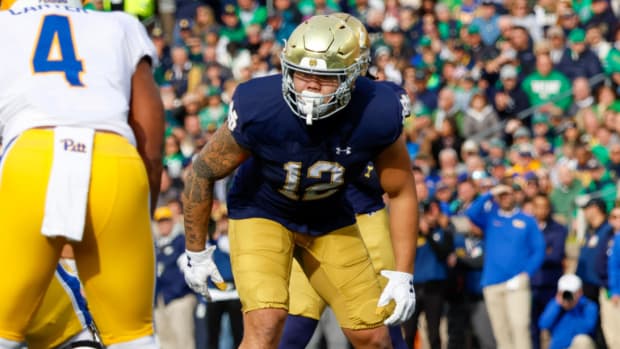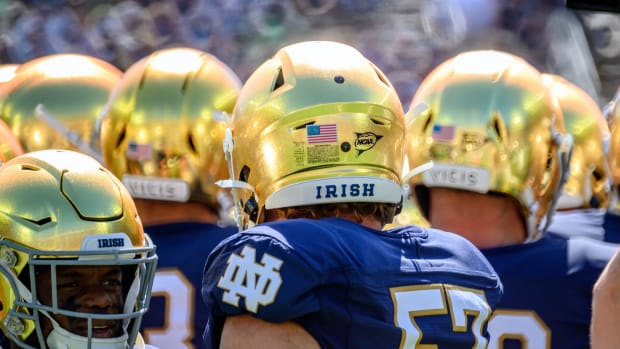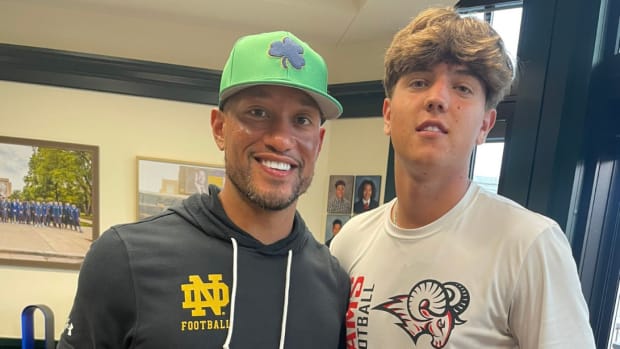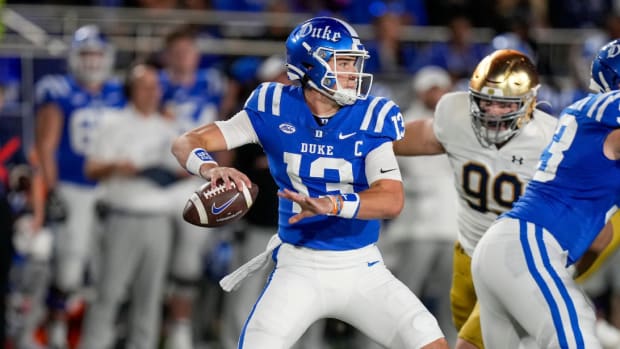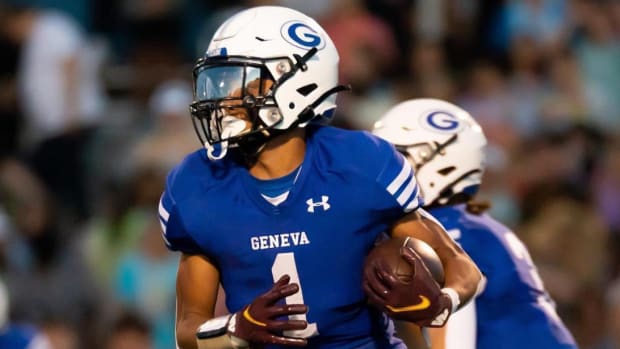From The Bleachers: On Michigan And Hatred
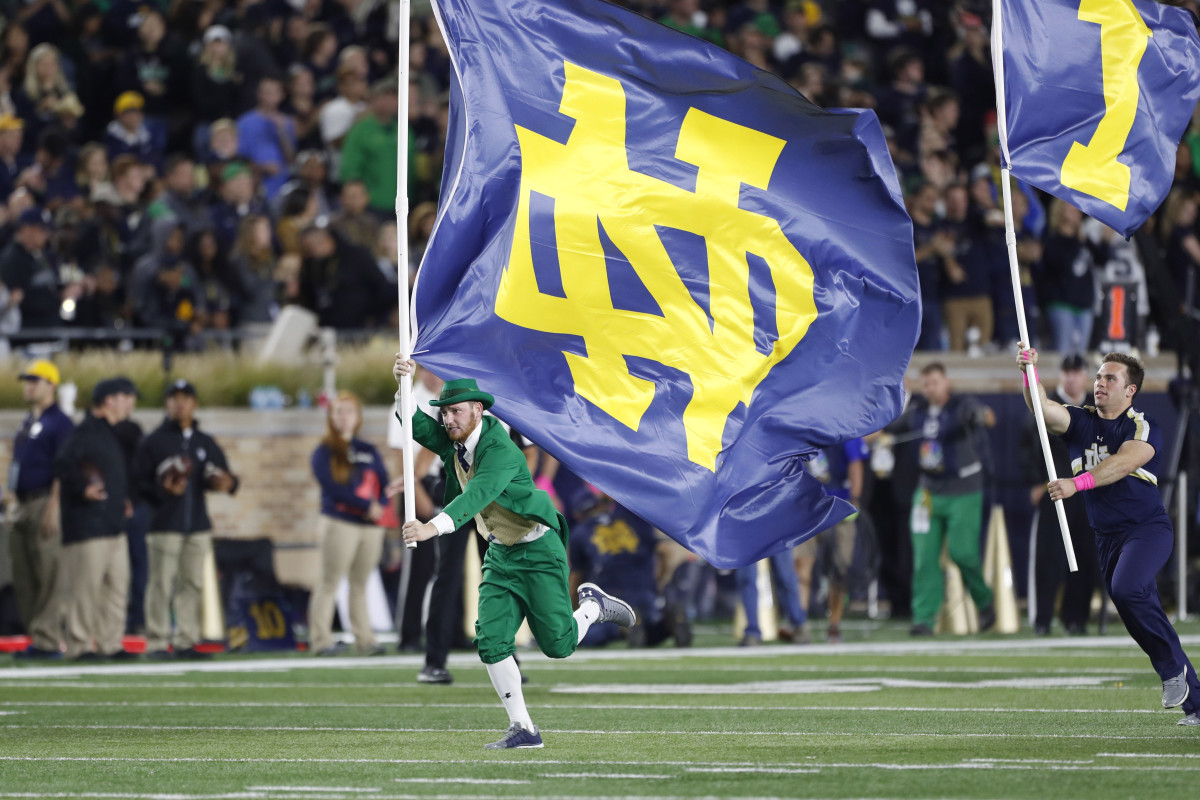
hatred
ha·tred | \ ˈhā-trəd
noun Definition
1: extreme dislike or disgust : HATE
2: ill will or resentment that is usually mutual : prejudiced hostility or animosity
My mother instilled in all of her children a love of God, of each other, and of humanity in general. Eight years of Catholic school (mostly) reinforced those concepts, and taught me and my siblings and all of our school mates how to “order our affections.”
In simple terms, hatred and hateful behavior were not tolerated. It was an emotion reserved for the devil, the Nazis, and Michigan football.
This last hatred I was both born into and later voluntarily chose to hold in my heart. There was a Monsignor in my home town who was straight out of central casting: a shock of white hair, red splotchy face with a bulbous nose, and the hint of an accent that was impossible to discern but was vaguely east coast sounding. He also swore a decent amount. Probably never so much as during the lead up – and the aftermath – of a Notre Dame/Michigan game. The first time I caught one of his infamous bursts of profanity was during a Saturday basketball tournament at our Catholic school gym. He was in a foul mood, no doubt because he was required to be at the tournament while his beloved Irish were playing a game against their hated enemy. He stood at the end of the bleachers, a Regency TR-1 transistor radio in his hand, an old-style metallic ear bud in one ear, and a healthy scowl on his face. Every now and then he would mutter something unintelligible to most of the bystanders, but clearly alarming to the associate Priest beside him.
Something awful must have happened because he quite loudly took the Lord’s name in vain and then tested the durability of his portable transistor radio by slamming it into the gym floor. The action on the court actually stopped for a few seconds as players, officials, scorekeepers, cheerleaders, fans and two not-very-amused nuns stared into the corner of the gym. If the Monsignor felt any shame, it was buried under several layers of disgust, and he stormed out into the foyer, dropping another colorful term between the phrase “I hate those” and the word “Wolverines.”
I looked up at my mother, eyes wide, scandalized expression on my face. She puzzled for a few moments over how to respond, then finally shrugged and offered, “usually hate is very bad, but it’s okay to hate Michigan.” Even if I did not understand it, I felt the truth of it in my bones. Also, I made a mental note to ask her what [redacted] meant.
That same fateful day I learned another curse word. I had no idea what it meant or from what language it was derived, but the tone and manner in which it was used made it clear it was not something for polite conversation. It was the other F word. Faust.
Gerry Faust was an enormously successful coach at one of the nations most prestigious programs. He was also, by all accounts, a genuinely nice man. He also had just had quite the debut as the Irish coach, walloping LSU 27-9 and landing at the top of the polls. Unfortunately, that prestigious program was Cincinnati Moeller – a high school program, and being genuinely nice does nothing for scoring points or stopping opponent’s offenses. Faust followed that glorious debut by getting steamrolled by Michigan 25-7 in game two. If ever a die was cast by a coach after two games, this was that time.
The Michigan game was a harbinger of things to come for Faust. Even though he would beat Michigan 23-17 in year two, he would have one of the more frustrating tenures in school history. He would never win more than seven games in a season and would bookend his career with identical 5-6 losing seasons. Perhaps the lowest point for Irish fans was having to hear Bo Schembechler’s gloating after a 20-12 Michigan victory during Faust’s swan song. “It means we’re decent. We’re not the dog people think we are,” said the coach who never won anything of significance. “Frankly, I expected more of a test from Notre Dame.”
The following year, Lou Holtz would come to Notre Dame and set things right again. Though he did not go undefeated against Michigan, his 5-3-1 record ensured he will be forever loved in South Bend. The fact that he was 3-1 vs. Schembechler makes that even more certain. This is not to say that Notre Dame coaches are measured only by their successes or failures against Michigan, but it has some bearing.
Bob Davie replaced Holtz and was 1-2 vs. the Wolverines. Tyrone Willingham, conversely, went 2-1. He beat them in his first year on the way to an 8-0 record and a national Coach of the Year Award. Apparently, this award was voted on before the 44-13 drubbing at the hands of our rival USC and the subsequent 28-6 beat-down in the bowl game, by NC State of all teams.
Notice the term “rival” affixed to USC, while Michigan was referred to above as “hated enemy.” Pundits will talk about the Notre Dame/Michigan game as a rivalry, but any self-respecting Irish fan should reject that term. Why? A rival is defined as a person or thing competing with another for the same objective or for superiority in the same field of activity. Sounds okay, right? Just to be sure, let’s check another source: a person, team, or business that competes with another. Again, that seems like it could apply. But then you open a history book, and you learn a different, more complete story.
In 1887, Notre Dame and Michigan faced off for the first time. Michigan won that game and they won the next several as they quite literally taught Notre Dame the game of football. (Author’s Note: Thanks guys!) Then, in 1909 Notre Dame finally broke through and won for the first time. The next year Michigan avenged that loss by … boycotting the series. Until 1942. Now, of course it wasn’t just because of one lost game people. That would be silly. No, the main reason was because Fielding Yost was an anti-Catholic bigot and organized a Western Conference (present day Big 10) boycott of the Irish. Whatever the reason, it was 33 years until the teams met again.
After two successive games in ’42 and ’43, they did not meet again until 1978. Michigan’s Fritz Crisler was instrumental in maintaining this hiatus, and in fact, tried to get the rest of the Big 10 to join him in another boycott. Purdue and Michigan State balked at that, so Fritz was left to stew all alone. All of that is just a long way of pointing out that to be a rival you have to be willing to compete with the opponent regularly and “seek superiority in the same field of activity.” Clearly, the Wolverines have not been willing to do that throughout the course of history. USC has.
Avoiding the Irish on their schedule off and on throughout history is not the reason I hate Michigan. There is no singular reason; there are dozens. I happen to hate Yost’s and Crisler’s bigotry. I hate Schembechler’s smug and unearned air of superiority. I hate Desmond’s Heisman pose, and Harbaugh’s slumber parties in recruits’ living rooms. And his pleated khakis. I hate the ugly helmets and the color of maize, and that shade of blue. I hate the fact that I cannot hate Charles Woodson, because he was so damn good. I hate the Big House for no good reason other than Michigan plays there. I hate Dan Dierdorf’s voice and the memory of Keith Jackson enunciating Schembechler as if it was the greatest sound he ever heard. I hate the stupid “those who stay will be champions” catch phrase. Hate it. Truly.
Despite the fact that my mom gave me the greenlight all those years ago to hate the Wolverines, and despite the fact that the last paragraph was 100% accurate, as I read it I was uncomfortable seeing that much hate. Ask anyone, I am a fairly jovial and warm soul and all that hate is a contradiction. So I think I should end this on a positive note. A note of love.
I love beating Michigan. I love seeing Harbaugh in the 4 quarter with that far-away look in his eyes, like he is trying to remember if he locked the back door, or turned the iron off, or set the DVR to record “his stories.” I love seeing 100,000 people sit in stunned silence – it’s genuinely inspiring. And I love my favorite Michigan alum and former football player, Mike Elston, who happens to coach one of the best defensive lines in the country. Notre Dame vs. Michigan… what’s not to love? The Wolverines of course.

